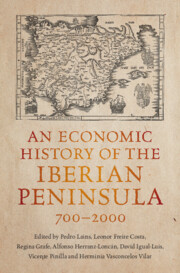Book contents
- An Economic History of the Iberian Peninsula, 700–2000
- An Economic History of the Iberian Peninsula, 700–2000
- Copyright page
- Contents
- Figures
- Tables
- Contributors
- Preface: By Way of Presentation
- Introduction
- Part I The Making of Iberia, 700–1500
- Part II Globalization and Enlightenment, 1500–1800
- 10 Patterns of Iberian Economic Growth in the Early Modern Period
- 11 Population of the Iberian Peninsula in the Early Modern Period: A Comparative and Regional Perspective
- 12 Institutions and Policy, 1500–1800
- 13 Early Modern Financial Development in the Iberian Peninsula
- 14 Science, Knowledge and Technology, 1500–1800
- 15 Living Standards, Inequality and Consumption, 1500–1800
- 16 Trade and the Colonial Economies, 1500–1828
- 17 The Economic History of Iberia in a Wider Context, 1500–1800
- Part III Industrialization and Catching Up, 1800–2000
- References
- Index
12 - Institutions and Policy, 1500–1800
from Part II - Globalization and Enlightenment, 1500–1800
Published online by Cambridge University Press: 22 February 2024
- An Economic History of the Iberian Peninsula, 700–2000
- An Economic History of the Iberian Peninsula, 700–2000
- Copyright page
- Contents
- Figures
- Tables
- Contributors
- Preface: By Way of Presentation
- Introduction
- Part I The Making of Iberia, 700–1500
- Part II Globalization and Enlightenment, 1500–1800
- 10 Patterns of Iberian Economic Growth in the Early Modern Period
- 11 Population of the Iberian Peninsula in the Early Modern Period: A Comparative and Regional Perspective
- 12 Institutions and Policy, 1500–1800
- 13 Early Modern Financial Development in the Iberian Peninsula
- 14 Science, Knowledge and Technology, 1500–1800
- 15 Living Standards, Inequality and Consumption, 1500–1800
- 16 Trade and the Colonial Economies, 1500–1828
- 17 The Economic History of Iberia in a Wider Context, 1500–1800
- Part III Industrialization and Catching Up, 1800–2000
- References
- Index
Summary
This chapter analyses the institutional architecture and political reforms of the Iberian monarchies from the sixteenth century to the end of the eighteenth century, underlining two main ideas. First, the persistence of an institutional model based upon jurisdictional autonomies until the end of the seventeenth century. This political framework was based on cooperation and negotiation allowing the participation of the different institutional and social bodies in the political decision-making process. Iberian monarchs and their ministers were able to establish alliances with local oligarchies, important noble houses, guilds and, of course, the Church. This system was partly disrupted by a movement of political reforms that reinforced State interventionism in the economy during the eighteenth century. Second, the limited economic impact of such reforms prevented an economic growth similar to other Western European territories. They faced resistance of the kingdoms and territories, which aimed to preserve their customs and the resistance of the privileged groups who struggle to maintain their properties and fiscal privileges. Both factors detained the attempts of centralizing reforms and undermined the process of increasing state capacity.
- Type
- Chapter
- Information
- An Economic History of the Iberian Peninsula, 700–2000 , pp. 310 - 334Publisher: Cambridge University PressPrint publication year: 2024



